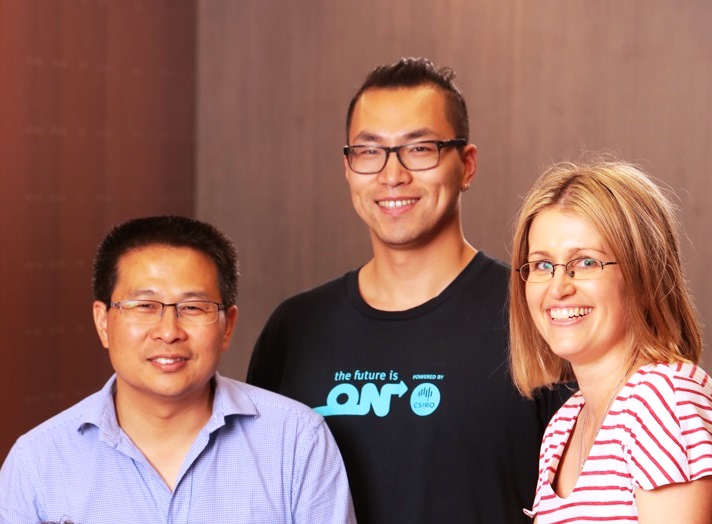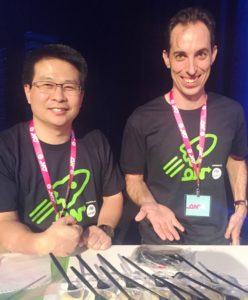

Seaweed-lobster jelly that helps children get more calcium is just one of several products set to roll out from Flinders University biomedical research team.
A new product called SeaNu, developed by Flinders and CSIRO researchers in Adelaide, is being marketed as a nutritious and palatable non-animal product for the one in two Australians who suffer from calcium deficiency.
The idea was presented in Melbourne this week to mark the end of the CSIRO’s 12-week ON Accelerate Program, which pairs researchers with mentors to help them move their ideas from the lab, out to investors, and then to consumers.
The new product will target global health and wellness markets, particularly in Asia where Australian marine products are highly regarded, says Professor Wei Zhang, director of the Centre for Marine Bioproducts Development at Flinders University.
Seaweed and lobster shell are not the first things you’d think of for a calcium boost in a tasty non-dairy dietary supplement, he says.
“Our products will make use of under-utilised, nutrient-rich Australian brown seaweed and also crayfish shells,” Professor Zhang says.
“Over recent years Flinders researchers have found ways to extract key compounds from seaweed and the food-grade byproducts thrown away during processing and packaging of Southern Rocklobster.
“We are confirming the nutritional value of these compounds and would like to see them used in a range of products.”
The 12-week ON Accelerate3 (third round) program started on 16 January 2017 when teams were given intensive training to develop business planning, commercialisation and pitching skills.
The ON Demo Night on 6 April gave teams the opportunity to pitch their innovations to an audience of industry experts, investors and potential partners for further funding and support for commercialisation.
The Flinders University included Professor Zhang, seaweed researcher Peng Su and nutritionist Dr Rebecca Perry from Flinders Partners, along with Dr Michael Conlon and Dr Damien Belobrajdic from CSIRO, Food and Nutrition (Adelaide).
Dr Belobrajdic says brightly coloured SeaNu jelly lunchbox snack packs would help children get the right amount of calcium.
“The problem we’re trying to solve is one in six people, including kids, are avoiding dairy,” he told the ABC.
“The alternatives either don’t taste great or they (parents) struggle to get the kids to take calcium supplements every day.”
Liza Noonan, from CSIRO ON Accelerate, says the program will help develop some great ideas in science.
“Every year there’s close to $10 billion of public money spent on research, but comparatively few direct mechanisms to support those researchers who test the viability of making real-work impacts with that science,” she said.
Ms Noonan said the program helped researchers develop strategies to turn their ideas into commercial success by building their entrepreneurial skills.
“We’re trying to break down some of those perceived barriers between research and industry,” she says.
The other ventures launched at the ON Accelerate3 event were:
NxtOil – Technology that allows the production of oil from leaves from any plant as a renewable resource to meet growing global demand for food oils, industrial chemicals and renewable fuels (led by CSIRO, Agriculture and Food).
Marine Visual Technologies Rapid video analysis to provide fast, real-time identification of fish at the ‘point of catch’ (led by CSIRO, Oceans & Atmosphere).
Silentium Defence New passive radar technology to allow the Australian Defence Force to keep tabs on an area but remain undetected (led by DST Group).
LuciGem New medical technology that uses nano-sized particles of ruby and diamond to improve patient diagnosis and treatments (led by Macquarie University).
Australian Silicon Photonics A device which allows low-cost, low power and high capacity phonic links within data centres (led by RMIT University).
DentalAR Augmented reality glasses for dentists allowing heads-up display so they can check a patient’s history while working (led by the University of Western Australia).
DetectORE A simple, cost-effective solution for geologists to find gold and mineral samples more easily (led by CSIRO, Mineral Resources).
Going For Gold A safe and cost-effective replacement for cyanide which allows miners to recover more gold from existing mines (led by CSIRO, Mineral Resources).
RadVet A standardised and effetive treatment for skin cancer in animals (led by University of Newcastle).

